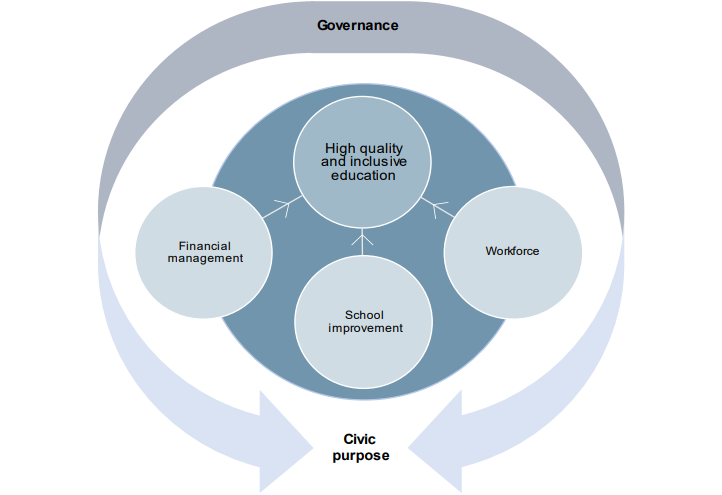The government will create new regional “development networks” to support growing academy trusts and publish reports on school sponsorship capacity in 55 areas with “the highest need”.
Ministers’ response to their regulatory and commissioning review also proposes a new “risk-based” approach to academy regulation, a simplified academy trust handbook and a review of parental complaint procedures.
The review was launched in June last year to “future proof” the role of academy trusts.
It was partly intended to give clarity on how the powers in the schools bill would be applied, but continued even after the legislation was scrapped in December.
Here’s what you need to know…
1. A single regulatory ‘interface‘
The DfE said its review had found its current approach to regulation “broadly provides the right safeguards, checks and balances against the most significant harms in the school system”.
But it also heard there were “areas of regulation where historic and accumulated requirements are no longer needed”.
A new “risk-based, proportionate regulatory approach” will focus on “promoting quality, striking a better balance between the need to protect against harms and the need to enable innovation”.
This will be partly be done by creating a “single interface” between the DfE and trusts through its regions group, making it “easier for trusts to engage regulators and submit returns”.
The DfE will also “fully embed” the recommendations of its review of the Education and Skills Funding Agency by this September.
2. A ‘simplified’ academy trust handbook
Requirements for trusts, in the academy trust handbook, will be “streamlined” as a result of the review.
This spring, the DfE will “work with the sector to review and rationalise the requirements in the handbook, ensuring they are clear, necessary and proportionate to the risks they seek to prevent”.
This will “remove outdated requirements and change our approach to financial oversight, so regulation is clearer and more proportionate to the risks it mitigates against”.
The revised handbook will take effect from September.
3. Review of complaints and ‘virtual assistant’
The government said it will “review our approach to processing parental complaints, ensuring the system is clearer for trusts, schools, parents and carers”.
This aims to make it “less duplicative” for parents, schools and trusts. The review identified “significant confusion and duplication” and said the system complexity makes it harder for regulators to “identify themes and emerging risks”.
The GOV.UK page on complaints will be updated “shortly”, making clearer which organisations should be contacted. DfE is also trialling a new “virtual assistant” for parents.
By autumn, a revised data sharing agreement between DfE and Ofsted will be introduced. This will “support better information sharing around safeguarding and complaints, alongside continued work to reduce duplication”.
4. Greater use of intervention at trust level
DfE will now “explore making greater use of existing powers to address underperformance at trust-level”.
This will be done on a “case-by-case” basis where there is “clear evidence suggesting trusts are failing to hold executive leaders to account for poor educational performance across the trust and its academies”.
The DfE will also continue to work with councils and dioceses to support “vulnerable” maintained schools. But when the majority of schools are in trusts, “we may well need to take new powers to ensure we can intervene effectively and proportionally”.
This would be done in consultation with the sector and be “clearly restricted to cases of significant and sustained underperformance”
5. New ‘statements’ to set out sponsor need
The DfE will today publish “trust development statements” for its 55 education investment areas – places ministers deem to be in “the highest need”.
The plans have been developed with trusts, dioceses and councils. They outline the “assessment of need” in each area and how they want the “trust landscape to develop in response”.
“In time, lessons about local capacity and strategic planning learned from these areas will be applied across the country.”
6. ‘Strong’ MATs will head ‘development networks’
In early 2024, DfE will trial “regional trust development networks”. These will be led by academy trusts with “strong track record of leading improvement”.
The government said their aim “will be to facilitate peer-to-peer support for all trusts and help deepen the sector’s understanding of how effective approaches in all five of the pillars of trust quality are spread across a trust’s schools”.
7. ‘More transparent’ commissioning
Ministers will introduce three stages of commissioning – the process by which schools are moved around the system – after sector feedback said it needed to be “more strategic and transparent”.
The first stage will involve the regions group assessing strategic needs of an area and “key” school-level characteristics. It would also look at financial and governance breaches as well as “high level” trust quality assessments.
The second stage will “consider quality factors” including trust record of delivering high quality education and school improvement.
The final stage will see the regionals group reach a recommendation in the “best interests of the schools, trusts and communities involved”.
The DfE will engage with the sector int he spring before publishing full commissioning guidance in June 2023. This will consolidate separate documents in one place and clarify the role of government advisory boards.
8. ‘Expanded’ descriptions of trust quality
These descriptions will build upon the five “trust strength” pillars from the schools white paper (see graphic), all channelled to trusts’ “wider civic purpose”.

In April, the DfE will publish proposed descriptions for each of these pillars.
The department said each description has been “extensively discussed” with the review’s external advisory group and other stakeholders “but we want to engage further to ensure we get them right”.
9. National mentoring for CFOs
The government will roll out nationally a new mentoring programme for MAT chief financial officers, which will match them with “expert peers”.
The DfE said following a “successful” pilot, they will now facilitate one-to-one mentoring across the country from this summer.
















When you say ‘trust’, do you mean ‘MAT’? Where is the space in all this for Single Academy Trusts? Or is it a Freudian slip…?